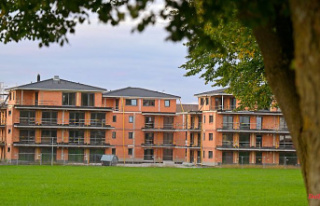In view of the high gas prices, the demand for cheaper coal, wood and pellets for heating has increased. What is an economic decision for the individual could jeopardize the achievements in air pollution control.
Magdeburg (dpa/sa) - The air quality in Saxony-Anhalt is constantly improving - however, a trend towards heating with coal, wood and pellets could endanger this development. It can be seen as a success that in 2021 the measured values for fine dust and nitrogen dioxide did not rise back to the pre-pandemic level, said the President of the State Office for Environmental Protection (LAU), Sandra Hagel, on Thursday in Magdeburg. The limit values were safely complied with at all 25 measuring stations in the country. According to the information, the main sources of particulate matter and nitrogen dioxide are traffic and agriculture.
Environment Minister Armin Willingmann (SPD) and Hagel fear an increase in pollution due to the energy crisis with high prices. Heating with cheaper coal briquettes, wood and wood pellets is widespread in the country. In 2021, a good 290,000 individual room heaters such as fireplaces, stoves and pellet heaters were registered in Germany. A good quarter is old and emits more particulate matter and soot than modern systems. These around 80,800 systems would have to be retrofitted or decommissioned by the end of 2024. Willingmann appealed: "Upgrade!"
The State Office for Environmental Protection can determine how large the effect will actually be with its state-wide air measurement network. The so-called black carbon can be measured at a total of 15 stations. It arises from the incomplete combustion of fossil fuels, biomass and biofuel. The soot particles could be measured automatically on five devices and the sources differentiated, explained Hagel. They immediately allowed conclusions to be drawn as to how much of the measured particles came from the combustion of biomass or from the use of fossil fuels. The first results could be available in early summer 2023.
Environment Minister Willingmann and LAU President Hagel emphasized that air pollution control is also associated with challenges beyond the energy crisis. The EU plans to tighten the limit values for air pollutants. If the new limit values for particulate matter and nitrogen dioxide were to apply today, there would be excesses in Magdeburg, Halle, Wittenberg and Halberstadt.












